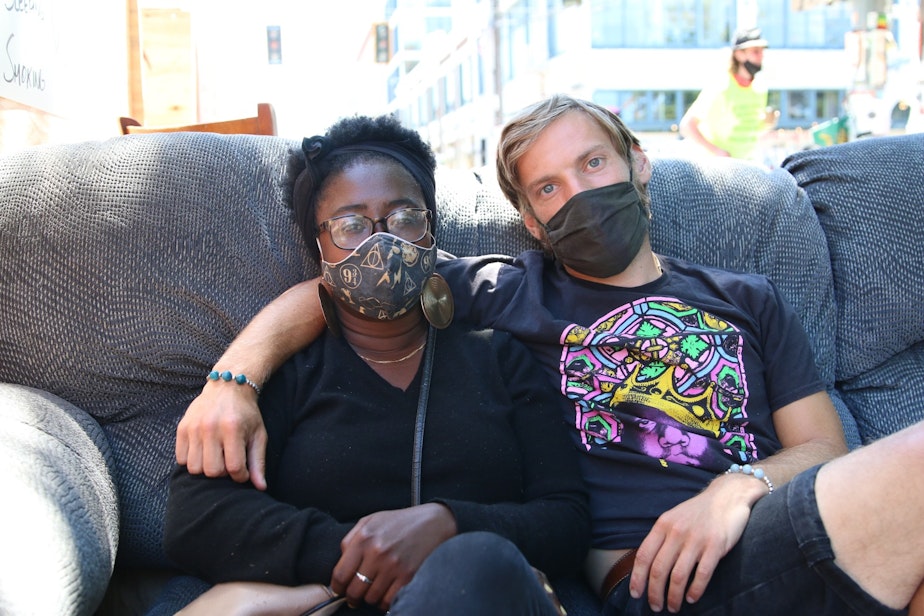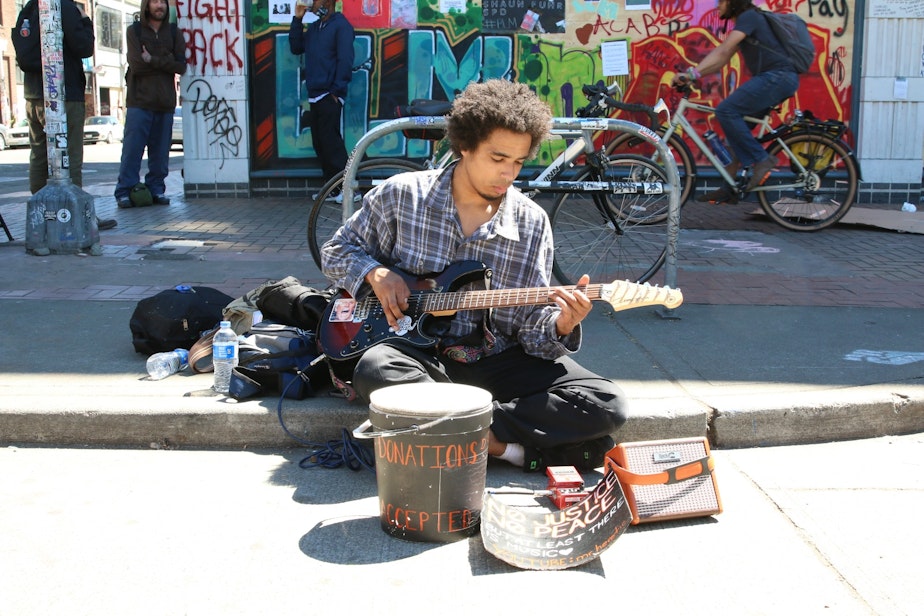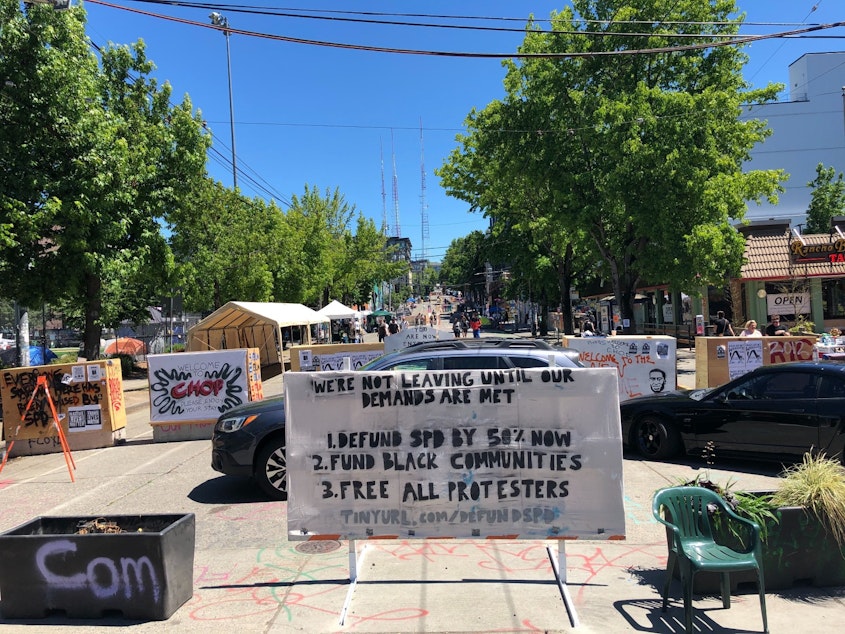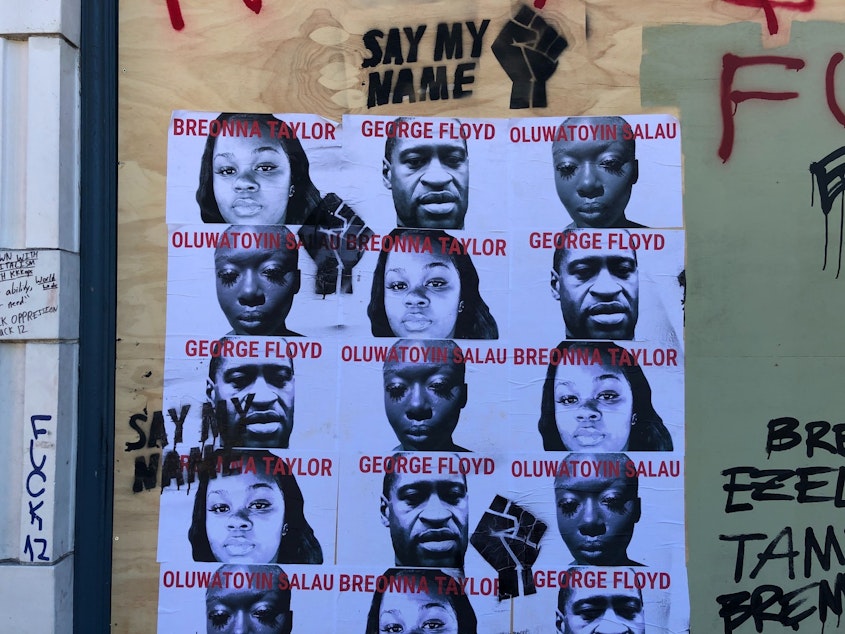In its final days, CHOP tries to create safety without becoming the police

This week, Seattle Mayor Jenny Durkan announced the CHOP will end, and police will return to the East Precinct building located at its center.
But in the meantime, occupants of the Capitol Hill Organized Protest zone are trying to show they can keep their community safe without police.
Three shootings over the weekend have changed the atmosphere in the CHOP.
Ahmahd Odom is sitting on the curb on Pine Street, playing his guitar. He’s a person of color, busking, and making OK money doing it.
The shootings have rattled him.
“I have PTSD because I recently got assaulted with a weapon," he explained. "And I have a fear when I’m out here that someone’s just going to come up and shoot me. I’ll be honest, I don’t entirely feel safe here. There’s a lot of risk coming out here because people think that this is the place that people can handle their beef and take somebody out without any real repercussions. It’s kind of scary.”

Not far from Odom, people are having conversations about race and policing at the Decolonization Conversation Cafe, which is basically a bunch of donated couches at one corner of the intersection. Keely Thomas helped start it with Jordan Lyon.
Thomas says the violence over the weekend has become a distraction to the work being done here.
“I’m actually really disappointed in how security has been handled since violence broke its way into the walls here," she said. "We’ve got to admit, we need some order to this autonomous zone. We can’t be Neverland forever."
But Thomas wants to keep this work going. She says the conversation circles here could be a model for other cities. She and Lyon hope to spin their project out into an organization that will outlast CHOP.
She does want to see the group handle their own security better, though. And she wants people to pick up the garbage, too.
READ: Mayor Durkan: Seattle police will return to East Precinct in near future
But the fact that you don’t see people who look like police officers is part of the plan, say some CHOP organizers.
“It’s not anybody in uniform. Ideally, the most you hear of some sort of security even being here is the distant beeping of walkie talkies,” said one member of CHOP's security force. He declined to give his name for safety reasons.
He’s on an encrypted CHOP walkie talkie, the kind only given to people who’ve proven they’re here to protect the community. And he carries a concealed firearm beneath his shirt.

“I hear a lot of people complaining that it’s absolute chaos, and there is no security or situations being handled in that way," he said. "And to me, those are good things – in the sense that they don’t see it. They don’t see a police presence in any way.”
They don’t see his weapon, either, which he conceals in order to try and not appear aggressive.
“It just – it keeps the energy level down. And people just don’t like to feel like they’re being controlled. Everyone wants to be protected, but not told what to do.”
He said his focus is on de-escalation. He said sometimes, that means staying back – even when a fight breaks out. He said that’s critical, to avoid the mistakes of the police.
“By forming some sort of organized security, it immediately runs the risk of being too similar, of having some of the same systemic flaws.”
Still, when the first shooting of the weekend happened early Saturday morning, this security volunteer did reach for the butt of his gun.
“I had my hand on it a couple times," he said. "Because, even with the communication system, there were times where it wasn’t instantly clear where the shots came from. Like, I wasn’t extremely close by, I was around the corner, so I heard it. And just hearing gunshots echo, not knowing even the direction the shooter’s at, it’s a little unnerving.”
He says he arrived on the scene and saw Lorenzo Anderson, the 19 year old shooting victim, just before he died.

The security volunteer says there was a lot of confusion that night. But he says CHOP security learned from that, and used those lessons when there was another shooting the next night.
Back on Pine Street, Ahmahd Odom says he’s OK with this level of security. He'd personally feel safer with police, he said, but understands why most people in the CHOP don't. And so, he says “I’m willing to put some faith in law abiding citizens with guns. And I would appreciate it if people came out here to protect. But that’s the most we can do without getting police involved.”
The police will move back into their precinct here eventually, the mayor has promised.
But the organizers here, in trying to keep their community safe on their own terms, hope by then they’ll have demonstrated a working alternative to traditional policing.

